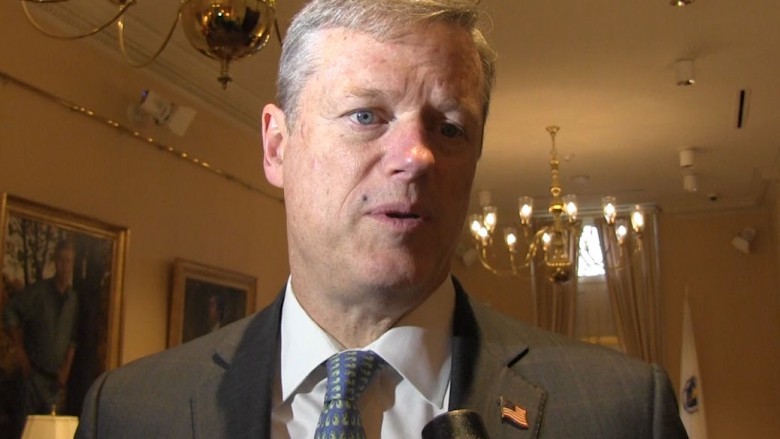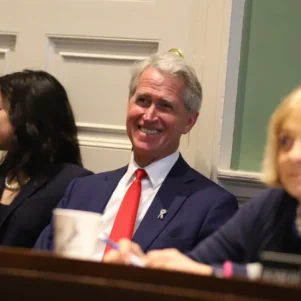Baker will have chance to name high court majority
By State House News Service | February 8, 2016, 12:10 EST
 Massachusetts Gov. Charlie Baker speaks to reporters in the State House in this December file photo. (State House News Service file photo by Antonio Caban)
Massachusetts Gov. Charlie Baker speaks to reporters in the State House in this December file photo. (State House News Service file photo by Antonio Caban) BOSTON – With Massachusetts Supreme Judicial Court justices Robert Cordy and Francis Spina stepping down this summer, Gov. Charlie Baker has gained the chance to make his first nominations to the state’s high court. Baker also will be in position to appoint a majority of the court before the end of his term, as more justices face mandatory retirement.
By 2019, when Baker’s term ends, two more justices will reach age 70, when Massachusetts judges, including those who sit on the SJC, are required by law to retire. The court has seven members.
Spina will turn 70 in November and would have been statutorily required to retire from the bench at that time. By March 2017, Justice Margot Botsford will have to retire from the court and Justice Geraldine Hines will have to do the same by October 2017, according to information provided by the court.
With Cordy’s early retirement, Baker will have the chance to nominate four of the seven high court justices, shaping the court and its judicial philosophy. Cordy, who served in Gov. William Weld’s administration with Baker before becoming a judge, is 66 years old.
“We are seeing history unfold here,” Martin Healy, chief legal counsel and chief operating officer of the Massachusetts Bar Association, said. “It took eight years for Gov. (Deval) Patrick to put his stamp on the court and Charlie Baker will put his indelible mark on the court in four short years. That’s unprecedented.”
Patrick appointed five SJC justices over the span of his two terms in office, shaping the court in his image and becoming the first governor to appoint a majority of the court in recent memory, Healy said. Now Baker will be able to do the same in just half the time.
“This governor is clearly handed a gift that not many governors receive, particularly within four years of service and that’s the opportunity to really shape the whole judicial branch, which plays such an important role now in society, much more so than we’ve seen in the past,” he said.
Healy said he expects that the Judicial Nominating Commission — the non-partisan group of 21 volunteers which screens applicants for judgeships before the governor make a nomination — will quickly begin its work to help narrow the field of potential nominees.
“I think it’s going to be a more centrist court, (Baker’s) probably looking for more moderate, middle-of-the-road type of candidates similar to what we’ve heard from other Republican governors,” Healy said. “He’s probably looking for candidates that will interpret the law but not necessarily make the law and those that clearly distinguish between the legislative process and the judicial process, and have a deep respect for the separation of powers.”
Healy also suggested that Baker might seek out younger judges, who would be able to serve on the SJC for many years before reaching the mandatory retirement age of 70.
At a press conference Friday afternoon, Baker laid out the variety of skillsets he would seek for appointments to the highest court.
“We want to appoint terrific people, very strong legal minds, people who are incredibly well respected by the legal community, folks who have a track record of being able and willing to do the work — and it’s a big workload that’s associated with serving on the SJC — and people who have the capacity to be collaborative — it’s a seven-member board — and can also participate in the superintendence requirements that come with this,” Baker said.
Regardless of who Baker nominates, the nominees will have to be approved by the Governor’s Council, the eight-member elected body that vets and must confirm judicial nominees. With so many SJC nominations on the horizon, Healy said the council will have “increased political strength” because of the importance of getting a nominee through the council without much acrimony.
“Gov. Baker has to play a game of chess here in terms of timing of appointments and he has to consider a number of factors such as person’s legal experience and how deep that is but also their political philosophy and how they have presented themselves so far in the legal profession,” he said.
Just after Cordy announced his intent to retire, members of the council said they look forward to vetting Baker’s nominees.
“Obviously this is something all of us take very, very seriously,” Councilor Terrence Kennedy said, adding that Cordy’s replacement will be the fifth SJC justice he will have vetted. “A single justice can have a huge impact on the commonwealth and on its citizens. I intend to carefully vet anybody the governor nominates.”
Councilor Robert Jubinville said trial experience is an important quality for any judge, but especially one who would sit on the SJC. He said he hopes Baker will nominate someone who is “a great writer, a great reader and a thinker.”
“It’s such an important position that I like to see somebody who has been through our court system,” Jubinville, a criminal defense attorney, said. “I like to see somebody familiar with all of our courts because everything that happens in other courts moves up to the superior court. So unless you know about those courts, it’s hard to relate to what’s going on.”
No matter who Baker nominates, Healy said the quick — for the judiciary — turnover of the high court will be “a very unique circumstance.”
“You’re seeing history made,” he said. “Within a few short years, we will have seen a Patrick-dominated court flip to a Baker dominated court.”
And whoever is sworn in as governor in 2019 will have the opportunity to nominate at least two justices to the SJC. So if Baker were to be re-elected for a second term, he would have the chance appoint six of the seven justices — all but Chief Justice Ralph Gants — which Healy said would be “unheard of.”
Written by Colin A. Young









